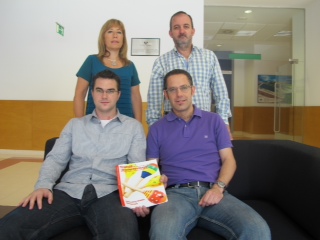Oct 24 2012
Researchers from the Universidad del País Vasco (UPV/EHU) Faculty of Pharmacy’s NanoBioCel group have published a review article about the latest advancements in three-dimensional stem cell cultures in the prestigious Trends in Biotechnology magazine.
 Four members of the NanoBioCel research group of the University of the Basque Country
Four members of the NanoBioCel research group of the University of the Basque Country
Nanomanufacturing by means of these cultures obtains several tissues like fat and bone from a single stem cell by modifying the rigidity and elasticity of the matrixes where it is cultivated.
Doctors Rosa María Hernández, José Luis Pedraz and Gorka Orive and the PhD student Edorta Santos summarize in the article the developments obtained during the last few years in the field of three-dimensional stem cell cultures and the knowledge acquired about the interaction of the cell and its environment.
Under the title ‘Novel advances in the design of three-dimensional bio-scaffolds to control cell fate: translation from 2D to 3D’, the work covers the advances obtained in this field, the foundation of regenerative medicine and the engineering of tissues of the future.
Thanks to these advances, in the future it will be possible to manufacture tissues and live medicines, which supposes a solution for medical problems which have not yet been resolved. The creation of bioartificial organs, for example, could settle the difficulties stemming from a lack of donations.